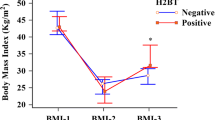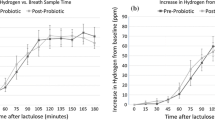Abstract
Background
Evidence suggests a role for small intestinal bacterial overgrowth (SIBO) in IBS. Recently, the question has arisen whether the lactulose breath test (LBT) is abnormal in IBS subjects due to overlapping GERD and proton-pump inhibitor (PPI) usage.
Aim
The aim of this study was to compare the prevalence of an abnormal LBT in IBS patients either receiving or not receiving PPI therapy.
Methods
Consecutive Rome I positive IBS patients referred for LBT completed a questionnaire regarding their symptoms and medication use. All subjects then underwent an LBT. The prevalence of abnormal breath test results and hydrogen production were compared based on PPI usage.
Results
Of a total of 555 (429 female) subjects, 106 (19.1%) subjects reported current PPI use. Among those on PPI, 46.2% had a positive LBT. This was not different from the 56.3% positive LBT in non-PPI subjects (OR = 0.67, CI = 0.436–1.017, P = 0.06). No differences in hydrogen parameter were seen with PPI. The average amplitude of rise (first peak) in PPI users was 28.0 ± 35.3 ppm from baseline; in non-PPI users it was 27.5 ± 29.1 ppm (P = 0.89). The average rise in the second peak in PPI users was 48.5 ± 43.8 ppm from baseline; in non-PPI users, it was 49.3 ± 37.6 ppm (P = 0.87). The time to first peak in PPI users was 56.4 ± 23.0 min; in non-PPI users, it was 58.2 ± 26.1 min (P = 0.58). However, among subjects receiving PPI only 7.5% had methane detection on LBT, which is significantly different from the 15.4% of subjects not taking PPI.
Conclusion
PPI therapy does not effect hydrogen production on lactulose breath tests in IBS patients. However, there may be an effect on methane.


Similar content being viewed by others
References
Bommelaer G, Poynard T, Le Pen C, et al. Prevalence of irritable bowel syndrome (IBS) and variability of diagnostic criteria. Gastroenterol Clin Biol. 2004;28:554–561.
Wilson S, Roberts L, Roalfe A, Bridge P, Singh S. Prevalence of irritable bowel syndrome: a community survey. Br J Gen Pract. 2004;54:495–502.
Gwee KA, Wee S, Wong ML, Png DJ. The prevalence, symptom characteristics, and impact of irritable bowel syndrome in an Asian urban community. Am J Gastroenterol. 2004;99:924–931.
El-Serag HB. Impact of irritable bowel syndrome: prevalence and effect on health-related quality of life. Rev Gastroenterol Disord. 2003;3(Suppl 2):S3–S11.
Hungin AP, Whorwell PJ, Tack J, Mearin F. The prevalence, patterns and impact of irritable bowel syndrome: an international survey of 40,000 subjects. Ailment Pharmacol Ther. 2003;17:643–650.
Agreus L, Svardsudd K, Nyren O, Tibblin G. Irritable bowel syndrome and dyspepsia in the general population: overlap and lack of stability over time. Gastroenterology. 1995;109:671–680.
Drossman DA, Richter JE, Talley NJ, et al. (eds) Functional gastrointestinal disorders: diagnosis, pathophysiology and treatment: a multinational consensus. Boston: Little Brown, 1994.
Pimentel M, Chow EJ, Lin HC. Eradication of small intestinal bacterial overgrowth reduces symptoms of irritable bowel syndrome. Am J Gastroenterol. 2000;95:3503–3506.
Pimentel M, Chow EJ, Lin HC. Normalization of lactulose breath testing correlates with symptom improvement in irritable bowel syndrome: a double-blind, randomized, placebo-controlled study. Am J Gastroenterol. 2003;98:412–419.
Lupascu A, Gabrielli M, Lauritano EC, et al. Hydrogen glucose breath test to detect small intestinal bacterial overgrowth: a prevalence case-control study in irritable bowel syndrome. Aliment Pharmacol Ther. 2005;22:1157–1160.
Grover M, Kanazawa M, Palsson OS, et al. Small intestinal bacterial overgrowth in irritable bowel syndrome: association with colon motility, bowel symptoms, psychological distress. Neurogastroenterol Motil. 2008;20(9):998–1008.
McCallum R, Schultz C, Sostarich S. Evaluating the role of small intestinal bacterial overgrowth (SIBO) in diarrhea predominant irritable bowel syndrome (IBS-D) patients utilizing the glucose breath test (GBT). Gastroenterol. 2005;128:A460.
Pimentel M, Park S, Mirocha J, et al. The effect of a nonabsorbed oral antibiotic (rifaximin) on the symptoms of the irritable bowel syndrome: a randomized trial. Ann Intern Med. 2006;145:557–563.
Al Shahara, Aoun E, Abdul-Baki H, Mounzer R, Sidani S, ElHajj I. A randomized double-blind placebo-controlled trial of rifaximin in patients with abdominal bloating and flatulence. Am J Gastroenterol. 2006;101:326–333.
Lembo A, Zakko S, Ferreira N, et al. Rifaximin for the treatment of diarrhea-associated irritable bowel syndrome: short term treatment leading to long term sustained response. Gastroenterology. 2008;134:A-545.
Nastaskin I, Mehdikhani E, Conklin J, et al. Studying the overlap between IBS and GERD: a systematic review of the literature. Dig Dis Sci. 2006;51:2113–2120.
Posserud I, Stotzer PO, Bjornsson ES, Abrahamsson H, Simren M. Small intestinal bacterial overgrowth in patients with irritable bowel syndrome. Gut. 2007;56(6):802–808.
Spiegel BMR, Chey WD, Chang L. Bacterial overgrowth and irritable bowel syndrome: unifying hypothesis or a spurious consequence of proton pump inhibitors? Am J Gastroenterol. 2006;103:2972–2976.
Khoshini R, Dai SC, Lezcano S, Pimentel M. A systematic review of diagnostic tests for small intestinal bacterial overgrowth. Dig Dis Sci. 2008;53:1443–1454.
Riedl A, Schmidtmann M, Stengel A, et al. Somatic comorbidities of IBS: a systematic analysis. J Psychosom Res. 2008;64(6):573–582.
Williams C, McColl KEL. Review article: proton pump inhibitors and bacterial overgrowth. Aliment Pharmacol Ther. 2006;23:3–10.
Theisen J, Nehra D, Citron D, et al. Suppression of gastric acid secretion in patients with gastroesophageal reflux disease results in gastric bacterial overgrowth and deconjugation of bile acids. J Gastrointest Surg. 2000;4:50–54.
Lewis SJ, Franco S, Young G, O’Keefe SJD. Altered bowel function and duodenal bacterial overgrowth in patients treated with omeprazole. Aliment Pharm Ther. 1996;10:557–561.
Pereira SP, Gainsborough N, Dowling RH. Drug-induced hypochlorhydria causes high duodenal bacterial counts in the elderly. Aliment Pharmacol Ther. 1998;12:99–104.
Fried M, Siegrist H, Frei R, et al. Duodenal bacterial overgrowth during treatment in outpatients with omeprazole. Gut. 1994;35:23–26.
Pimentel M, Mayer AG, Park S, et al. Methane production during lactulose breath test is associated with gastrointestinal disease presentation. Dig Dis Sci. 2003;48:86–92.
Pimentel M, Lin HC, Enayati P, et al. Methane, a gas produced by enteric bacteria, slows intestinal transit and augments ileal contractile activity. Am J Physiol Gastrointest Liver Physiol. 2006;290:G1089–G1095.
Locke GR 3rd, Zinsmeister AR, Fett SL, et al. Overlap of gastrointestinal symptom complexes in a US community. Neurogastroenterol Motil. 2005;14:29–34.
Thorens J, Froehlich F, Schwizer W, et al. Bacterial overgrowth during treatment with omeprazole compared with cimetidine: a prospective randomized double blind study. Gut. 1996;39:54–59.
Rubinstein E, Mark Z, Haspel J, et al. Antibacterial activity of the pancreatic fluid. Gastroenterol. 1985;88:927–932.
Fass R, Shapiro M, Dekel R, Sewell J. Systematic review: proton-pump inhibitor failure in gastro-oesophageal reflux disease––where next? Aliment Pharmacol Ther. 2005;22:79–94.
Neal KR, Scott HM, Slack RCB, Logan RFA. Omeprazole as a risk factor for Campylobacter gastroenteritis: case-control study. BMJ. 1996;312:414–415.
Dial S, Alrasadi K, Manoukian C, Huang A, Menzies D. Risk of Clostridium difficile diarrhea among hospital inpatients prescribed proton pump inhibitors: cohort and case-control studies. Can Med Assoc J. 2004;6:33–38.
Cunningham R, Dale B, Undy B, Gaunt N. Proton pump inhibitors as a risk factor for Clostridium difficile diarrhoea. J Hosp Infect. 2003;54:243–245.
Acknowledgments
We would like to thank the Beatrice and Samuel A. Seaver Foundation as well as the Singleton Foundation for their financial support of this study.
Author information
Authors and Affiliations
Corresponding author
Rights and permissions
About this article
Cite this article
Law, D., Pimentel, M. Proton Pump Inhibitor Therapy Does Not Affect Hydrogen Production on Lactulose Breath Test in Subjects with IBS. Dig Dis Sci 55, 2302–2308 (2010). https://doi.org/10.1007/s10620-009-1010-2
Received:
Accepted:
Published:
Issue Date:
DOI: https://doi.org/10.1007/s10620-009-1010-2




